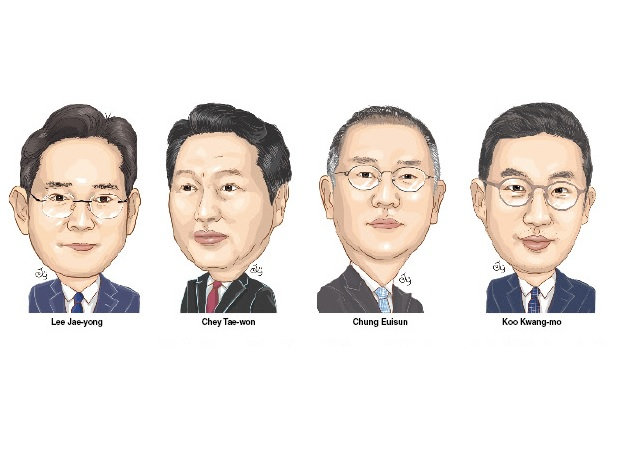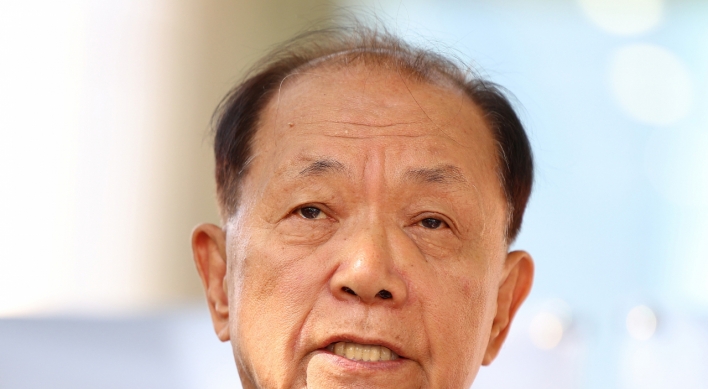Chaebol chiefs have hands full after summit
Samsung, SK chiefs extend overseas stay to enhance global network
By Jo He-rim, Byun Hye-jinPublished : May 1, 2023 - 18:12

South Korea’s top chaebol chiefs who accompanied President Yoon Suk Yeol on his state visit to Washington last week have returned with their hands full of hot-button issues, including the increasingly protectionist policies in the all-important US market.
With no immediate breakthrough in related talks between the two countries, industry watchers say the business leaders seem to be in a rush to study the industrial implications of the summit talks and come up with follow-up measures.
After the weeklong US trip, some of them are extending their overseas stays, possibly in a bid to bolster their global network, while others came back home to inspect local operations.
Visiting the US for the first time after being promoted to chairman, Samsung Electronics’ Lee Jae-yong is continuing his trip to meet with chiefs of major US tech companies, such as Google CEO Sundar Pichai.
All eyes are on how the high-profile meeting will play out, as it comes amid speculations that Samsung may ditch Google for Microsoft’s Bing as the default search engine on Galaxy smartphones.
Lee, who is expected to stay in the US until mid-May, is also set to meet with Apple CEO Tim Cook, Noubar Afeyan, Moderna’s co-founder and board chairman, and Hans Vestberg, the CEO of US’ No. 1 telecommunication firm Verizon, among others, according to industry sources.
Lee was able to extend his US trip, as his next trial date in Seoul over the 2015 merger of two Samsung affiliates is set for May 26.
Lee, however, is unlikely to visit Samsung’s Taylor foundry currently under construction in Texas, sources say, as time is too sensitive considering the tension escalating between Washington and Beijing over their protectionist semiconductor policies.
With the US production plant under construction, Samsung Electronics, the world’s largest memory chip maker, has reportedly applied for subsidies from the US’ chips support program, despite industry concerns over the strict requirement.
The US’ Chips Act has largely been perceived as “burdensome” for the global chip industry, as it requires beneficiaries to share classified business information and excessive profits with the US government, and limits their China operation, in return for subsidies in building chip plants in the US.
During the summit talks last week, Presidents Yoon Suk Yeol and US President Joe Biden announced their agreement on strengthening cooperation in semiconductors after their summit last week, and their respective trade ministers and commerce secretaries also released a joint statement reaffirming cooperation.
But their promises lacking concrete action plans to resolve the burdens Korean companies feel under the CHIPS Act came as a disappointment for industry watchers.
“The Korean chip industry has had low expectations of the (two) presidents announcing some drastic change in the summit. Still, anticipation was high for the leaders to make a little more progress beyond the win-win rhetoric," an industry official said under the condition of anonymity.
"We will have to wait for further development of their negotiations."
While SK hynix, the world’s No. 2 memory chipmaker, is looking for a site to build its chip packaging plant in the US where it has no production base, SK Group Chairman Chey Tae-won also appears to be passing up on a semiconductor-related itinerary for now.
Like the Samsung chief, Chey has extended his US trip to take the opportunity to travel to South America as a presidential envoy to meet with government officials and entrepreneurs there in a bid to bolster economic ties.
Chey, who is also the chairman of the Korea Chamber of Commerce and Industry, and leading the committee supporting Busan’s bid to host 2030 World Expo, also asked for South American nations’ support for the Busan bid.
In the meantime, Hyundai Motor Group Executive Chair Chung Euisun and LG Group Chairman Koo Kwang-mo have returned to Korea.
Sources say Chung is likely to focus resources on speeding up the construction of the carmaker’s first electric vehicle production plant in Georgia slated for 2025, as all Hyundai and Kia cars were recently excluded from a list of EVs benefiting from hefty tax cuts under the Inflation Reduction Act in the US.
With no immediate breakthrough in sight in talks for a grace period to put IRA rules on EVs made outside American soil, the Hyundai chief is expected to come up with more concrete countermeasures to bolster responsiveness to the protectionist sentiment in the US.
Before the completion of the Georgia plant, Hyundai plans to fill the void of the US tax credit by ramping up its lease and rental businesses, which are exempt from the IRA.
During Yoon’s visit to the US, Hyundai also announced a plan to set up a battery plant together with SK On in Georgia in a move to install made-in-US batteries in its EVs. Under a $5 billion investment, the plant is set to start production by late 2025 with an annual capacity of 35 gigawatt-hours, enough to supply batteries to 300,000 EVs.
“Despite Hyundai’s efforts, it might not be enough to prevent the drop in US sales. Washington should make extra efforts to prevent companies from bypassing the law like Ford and CATL so that the Korean carmaker is not discriminated against,” said Lee Ho-geun, a car engineering professor at Daeduk University. Ford and CATL recently signed a deal to set up a joint venture in which Ford will be using EV battery technology licensed from CATL.
The LG chief is also expected to continue his push for battery leadership. Before the US trip, Koo stopped by LG Chem’s cathode manufacturing plant in Cheongju, North Chungcheong Province. He underscored the importance to maintain a leading position in production of cathode, key material for EV batteries, amid burgeoning demand for clean cars.
Koo’s visit comes as the US’ Inflation Reduction Act requires stricter regulations to move the company’s battery supply chain to North America. LG Chem is building a cathode plant in Tennessee. LG Energy Solution, its battery manufacturing unit, is operating and setting up seven plants and joint ventures in the US, likely to create synergy with the parent company.
“In order to receive tax credits, operating production facilities in the US is faster the better. LG Energy Solution, in particular, is expected to gain benefit with its first mover advantage in the US,” said Lee.





![[KH Explains] No more 'Michael' at Kakao Games](http://res.heraldm.com/phpwas/restmb_idxmake.php?idx=644&simg=/content/image/2024/04/28/20240428050183_0.jpg&u=20240428180321)













![[Herald Interview] Mistakes turn into blessings in street performance, director says](http://res.heraldm.com/phpwas/restmb_idxmake.php?idx=652&simg=/content/image/2024/04/28/20240428050150_0.jpg&u=20240428174656)
